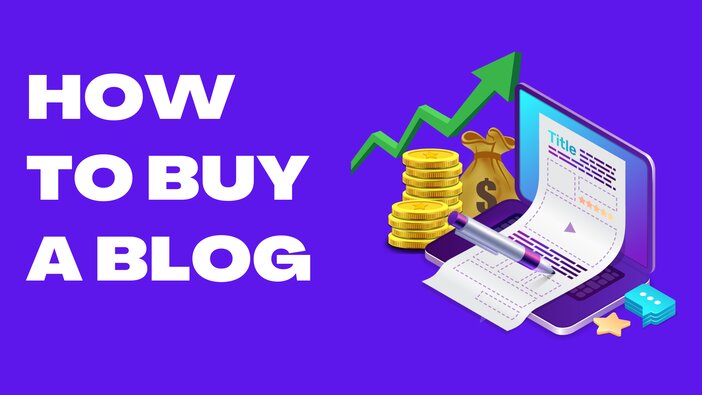Why launch a fresh blog from the ground up when you can quickly purchase a successful website that is already up and running? This “How To Buy A Blog” guide will help you navigate the fast-growing marketplace for buying and selling internet businesses.
Purchasing websites is now a big business, and if you understand what you’re doing, it may be a wise investment.
If you are looking for how to buy a blog, this post will walk through the whole process involved and also show the best platforms to buy a blog.
Let’s dive right in.
How to Buy a Blog or Website
If you’d like to avoid the hassle of setting up a blog from concept to completion, the best option is to purchase an existing website.
Listed below is a step-by-step guide on how to do it:
1. Know what you want
The initial step is to determine what you truly desire and what you hope to accomplish by purchasing an existing website. Are you searching for a blog that you can take control of and enhance so that you may sell services and products on it? Or are you seeking a website to upgrade and resell quickly for a profit?
If you fit into the initial bracket, then investing in a website is a critical business decision that can provide you a competitive advantage. If you’re in the latter group, the most crucial tip is to purchase undervalued online businesses, add value and resell at a higher price.
2. Perform a due diligence investigation
Make sure you’ve done your homework. If you’re buying via a website like Flippa, the listing will detail everything that comes with the purchase, as well as its statistics and history that the owner has confirmed to be accurate and genuine.
If you’re buying on your own, ask the webmaster to show you screenshots of their revenue and traffic.
In any case, get second or third perspectives from people who work in the same market or business.
More knowledgeable bloggers can easily examine a website’s analytics and determine whether or not they are accurate. They may also assist you with ideas on how to optimize the website and increase revenue.
That’s why, before buying other websites, you should first try to establish yourself also as a blogger with a good network of industry experts.
Confirm that the vendor is willing to provide you with information such as their addresses, names, mobile numbers, and corporate numbers. And then cross-reference that information with any government records available in your country.
You want to make sure that this person controls the blog’s contents and domain name, and that they have the right to sell both.
3. How much money do you have?
Purchasing a website, particularly one that has been operating for a long period of time and also has a concise and catchy domain name, may be pretty costly. In addition, you want to avoid paying more than what it’s truly worth.
You should also consider how much longer you can stand to wait for a payoff. If you desire to achieve an ROI in under a year, don’t invest upwards of 12x the website’s monthly net earnings, according to a conventional rule of thumb.
However, due to the recent surge in demand for online businesses, blogs now sell between 25X to 60X. Where X is the net income of the business. As you can see, the range of the multiplier is quite broad.
Therefore, understanding a blog’s monthly earnings is critical to determining its true value. To ascertain a blog’s valuation, you need to take account of the following:
- What are the sources of revenue for the website?
- Is it steady and consistent?
- Is there more than one revenue source on the website or just one?
- How reliable are the income streams?
See Also: Learn How to Make Money With Blogging [New & Proven Ideas]
4. You should be aware of what you are purchasing
Make sure you understand precisely what you’re purchasing. Is it only the domain name or the full website, including databases, contents, servers, visitors, photos, mailing list, and so on? Simply try to be as specific as possible.
5. Make a contract
A contract is beneficial for defining a sale process. It can help to resolve any issues that may occur in the future.
Please don’t use some random resource you find on the internet. Consult an Intellectual Property lawyer in your country to get proper guidance.
6. Obtain a non-compete agreement
If you’re purchasing a blog from an individual, keep in mind that they likely have a wealth of industry knowledge and connections.
The worst thing you would want to do is invest a lot of money on a website only for them to create a similar one and steal your market.
7. Demand for support
If the former website owner is ready to remain onboard for a couple of months to help you understand how to manage the website, this would save you from potential issues. If you are able to get the person to continue producing articles until you do, you’ve hit a gold mine.
Support from the former owner of your business presents a major learning opportunity for both you and your company.
8. Purchase from a third-party vendor
Using a service like Escrow helps to protect both the buyer and the seller. They won’t transfer the domain name until the money has cleared, and vice versa. They function as a middleman between the two parties, preventing the transaction from being completed unless both sides are satisfied.
9. Purchase in stages
It’s typically a good idea to buy in phases. Before you transfer the money, the blog owner might email you the databases and give you access to the hosting.
After that, you transfer the funds to an Escrow. Once the Escrow confirms the funds, the person completely transfers the control of the domain name to you.
The domain name is actually the last clearance for a transaction. You haven’t acquired anything unless you have possession and authority over it.
10. Ask for a money-back guarantee
Last but not least, I’d like to point out that websites like Escrow and PayPal frequently enable you to recover your money back if anything goes wrong or if you are scammed. If you’re a seller, you need to be careful about this. You could lose your blog and payment.
Before making any online purchase (whether it’s for a website, an enterprise, or anything else), do some research and learn how things work for each service and in each region.
See Also: WordPress vs Blogger: Which Is The Best? [Head-To-Head Comparison]
Best Places to Buy a Blog or Website
There’s no need to hunt for a platform to acquire a blog or website because the list below covers the top places to buy a website online.
1. Sedo
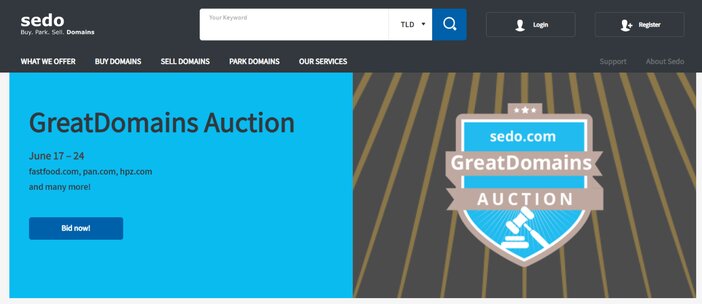
Sedo is a website where you can buy and sell domains. We’re all aware of how lucrative domains can be.
It all comes down to having the insight and vision to realize what type of value each name might have. The auction is one of the most exciting aspects of purchasing or selling domains on Sedo.
This implies but if nobody challenges you for a domain, you can really acquire good domains for less than you anticipate paying.
Similarly, sellers that participate in these auctions have the possibility to get more than they expect.
Sedo Pros
- There are around 2 million domain names for sale in this massive marketplace
- Sedo accepts payments and receives payments via credit card, PayPal, and bank transfer
- Sedo will park your domain for free while you seek to sell it
- If you don’t share a common language as the seller or are in a hurry, you could hire Sedo to help you close the deal
Sedo Cons
- Only for domains
- They keep a 15 percent commission on sales
2. Empire Flippers
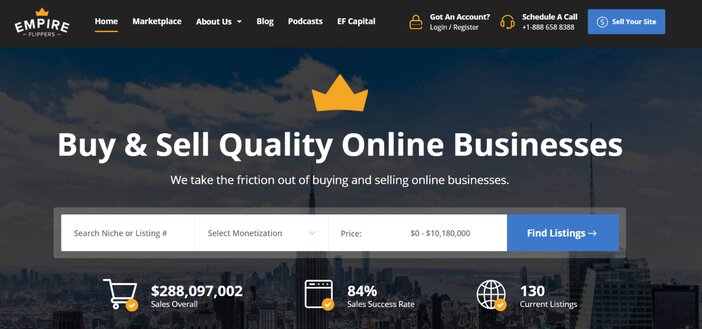
Empire Flippers exclusively works with well-established websites; in fact, that’s how they got their start. They are among the most reputable companies for buying and selling blogs.
Empire Flippers have handled over $280 million in online businesses in a range of verticals, ranging from affiliate marketing blogs to online storefronts, to date. Is it, however, the best medium for you in terms of buying and selling a blog?
Empire Flippers Pros
- From traffic metrics to income, all data regarding the websites are properly verified by their internal team
- They provide a complete solution, which means they handle all of the tasks involved in moving the website to a new buyer
- Safe and secure: the platform has never had any issues with scammers
Empire Flippers Cons
- A 5% payment is required to obtain 12-month data. It’s reversible and serves as a confirmation of trust, but it can also be a hindrance
- Only high-end websites are allowed: if you’re looking for a cheap website, search elsewhere; Empire Flippers doesn’t do anything under $30,000
- It costs $297 to list a site for the first time, with no certainty that it will sell
3. FE International
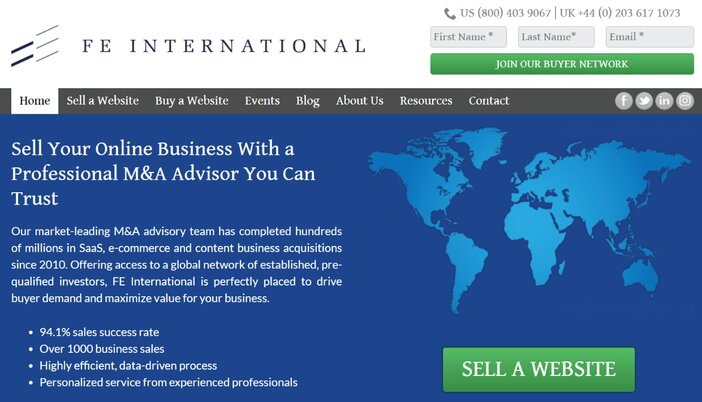
It’s similar to Empire Flippers in the regard that there won’t be hundreds of postings, but there will be 30-40 high-quality enterprises that are profitable.
For example, the most costly listing that has been sold so far is a B2B SaaS tool which sold for around $100m.
If you’re seeking those kinds of offers, or if your website meets those requirements, this could be the place for you.
FE International specializes in software as a service (SaaS), e-commerce, and information and content websites (e.g. blogs, review sites, etc.)
They perform due diligence on all of the properties they offer, ensuring that only legitimate, well-established websites enter the marketplace.
The commission fee charged by FE International varies between 10-15% depending on the amount of the sale (lower commissions are for larger deals).
There are no listing fees; you will only be charged if your website sells, and FE International has a 94.1 percent success rate, so your website is likely to sell.
If you’re a merchant, simply reach out to the FE International staff to get started.
If you’re a buyer, you’ll have to apply for accessibility to a website’s details through the listing. You can also join the FE International buyer network by filling out a form.
FE International Pros
- Years of expertise and a tried-and-true vetting procedure. Sellers’ revenue statistics and bank accounts are thoroughly scrutinized
- They claim to have a 94.1 percent transaction completion rate
- As a member of their vetted buyers’ program, you will be the first to hear about new offerings before the broader public
FE International Cons
- Only higher-ticket blogs will be found here; if you’re seeking smaller websites, this isn’t the best place to look
- Buyer’s fee: If you successfully acquire a website, you will be billed a 2.5 percent transaction fee and this can go up to $1000
4. Flippa
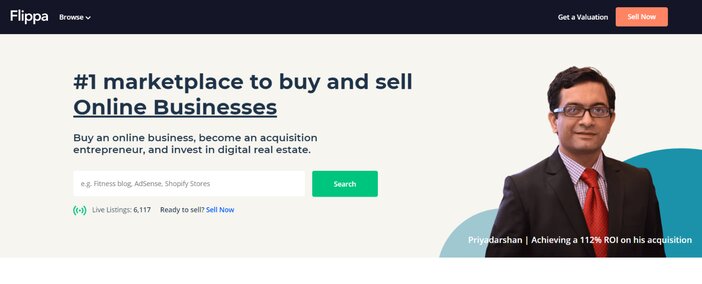
It can be used for almost anything, and there are solutions for various budgets. For example, you can come across a $1,000 website adjacent to a $600,000+ successful website.
Nevertheless, because it’s quite an open market, you may have to sift through some low-quality blogs in order to locate a valuable website.
Flippa allows you to buy and sell almost any type of online property, including domain names. Blogs, websites, eCommerce stores, Amazon FBA stores, apps, SaaS solutions, and more can all be bought and sold on Flippa.
They charge a listing fee as well as a commission when a sale is completed. For established blogs, the listing price is $49, and the commission goes from 10% for websites under $50k to 5% for enterprises above $100k.
All you have to do is create a Flippa account to purchase or sell an online business in order to get started.
Some postings are public, which implies you can immediately see the domain name and other relevant details. Others (usually the more premium ones) are private, so you’ll have to contact the vendor for further information.
Flippa Pros
- A large marketplace
- Domains, websites, and apps are all supported
- Getting started is simple
Flippa Cons
- There is a listing charge
- Credit card usage is not encouraged
5. Investors Club
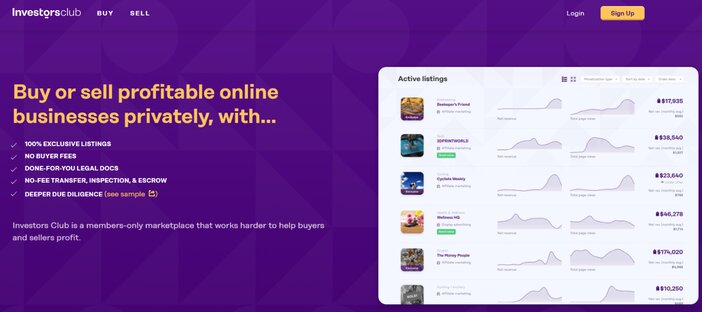
Investors Club is the newest platform in town, having debuted in 2020. The reality that it is a members-only marketplace distinguishes it from other platforms for buying and selling blogs, websites, and online businesses.
The great thing is that becoming a buyer member is completely free, with the only stipulation being that you have evidence of cash which is a minimum of $10,000. Part of the purpose of the proof of funds and charge is to screen out tire kickers.
Just sign up for the VIP membership if you want immediate access to all new discounts. This will also offer comprehensive due diligence reports for a monthly fee of $247 per month or $747 for a lifetime.
Investors Club Pros
- Expect fresh deals every couple of days if you have a healthy transaction history
- Low commissions: their seller’s commission is restricted at 5%, and there are no buyer’s commissions
- Free transfer fees, due diligence reports, and free escrow are among the included services
- One-on-one support available
- Legal documents prepared for you
- Less prone to scammers
- Has over 4000+ members who are cash-backed with money in their pocket and ready to buy your website
Investors Club Cons
- Buyers must pay a membership fee because free members can only access a censored version of all listings (URL and basic information). You’ll need to upgrade to a paying subscription to get the entire analysis and access to seller interviews
Frequently Asked Questions
1. What should you expect to pay for a website?
25 to 60 times the net income.
For the best price, any website can be a worthwhile investment.
Although the average of 25 to 60 times monthly earnings is a widely acknowledged figure, it leaves a lot of opportunity for debate.
When you decide to buy a website, there are a few things to keep in mind, ideas that will help you secure a good deal and profit from your new venture.
Recognize that many revenue sources are difficult, if not impossible, to verify. This suggests there’s a chance the owner is exaggerating the blog’s earnings to negotiate a better deal.
2. What are website brokers and how do they work?
Website brokers act as an internet intermediary, allowing you to quickly list your blogs and websites for sale or purchase websites listed on their markets.
Since a website broker would handle all of the grunt work and hard lifting for you, the phrase “quickly” was used.
Website brokers will assist sellers in determining the value of their website, marketing it for sale, attracting potential purchasers, and processing the sale.
If you’re buying websites, on the other hand, website brokers can help you identify the best possibilities. They will show you all of the websites for sale that meet your criteria and provide you with a suggested selling price.
Even after the sale, website brokers will offer post-sale assistance to help buyers familiarize themselves with their new website.
3. How do you determine the worth of a blog before buying it?
There are several factors that go into determining the value of a website as a possible buyer, these includes:
- How much money does the website make?
- What is the website’s age?
- The website’s monetization tactics
- Content quality and the number of backlinks to the website
- The number of people who visit the website
- If it has an email newsletter or popular social media channels, that’s a plus
4. What are the disadvantages of purchasing a website?
There are a few drawbacks to purchasing a website, both for novice bloggers and for those who are already established.
The most obvious issue with purchasing a website is that users have learned to expect the present blogger’s personality and the site’s themes.
Would visitors and subscribers enjoy the new website’s personality as much as they did with the previous one?
After a transfer of ownership, there is frequently a drop in traffic due to the change in personality, style of writing, and even how the site is monetized.
Another disadvantage of purchasing a website is that current revenue does not guarantee that you will make money. You’ll be paying up to 2 or 3 years’ worth of income for the blog, so you’ll have to figure out how to build it and keep it running to make it worthwhile.
Lastly, situations may change. For instance, most blogs rely on organic traffic sources. Search engines may change their algorithms that may affect the buyer’s investment outlook.
See Also: 10 Profitable Blog Niches That Will Make You a Ton of Money
Conclusion
Attempting to purchase a website needs much planning. It is not straightforward to make a definitive decision about which website to purchase as well as how to get the most out of it.
Purchasing an existing website has various advantages, the most important of which is the time saved by not having to start from scratch in terms of traffic and audience.
You may make it into a lucrative and enjoyable endeavor for yourself if you play your cards well, do your homework, and find areas of opportunity.
You’ll be well on your path to buying a website and profiting from it if you follow the advice in this post.
As a result, if you’re planning to buy a blog today, Flippa is the best site to use for those on a shoe-string budget. Investors Club, on the other hand, is a better option if you want a more hands-free done-for-you service.
However, if you are adventurous and looking for unusual deals, you can check out Facebook groups where individuals buy and sell blogs without third parties or brokers. Just beware of the risks involved.
Blogamigo is an online resource that offers the most effective ways for growing your blogging business. Several reviews of the top tools you’ll need to make six figures blogging can be found here.
